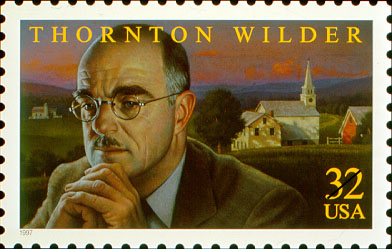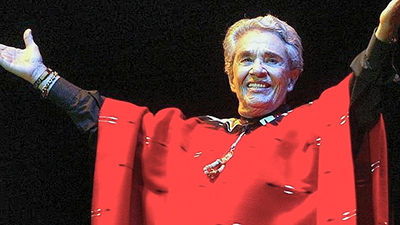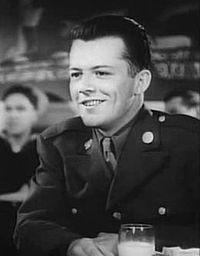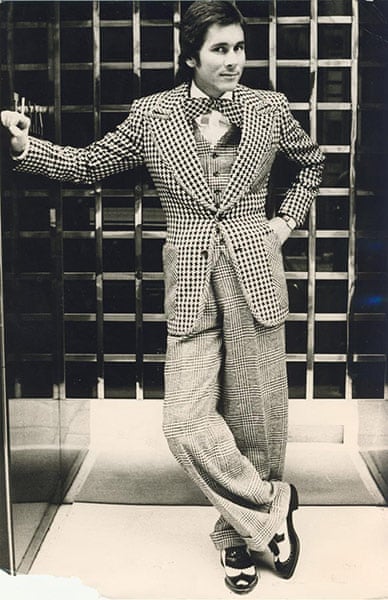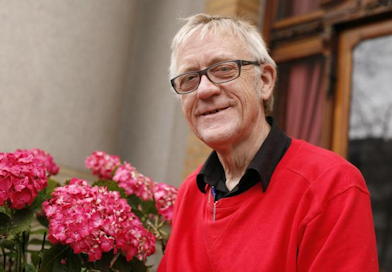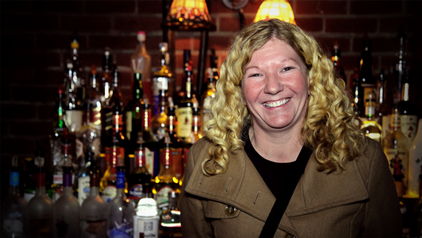|
presents THIS DAY IN GAY HISTORY based on: The White Crane Institute's 'Gay Wisdom', Gay Birthdays, Gay For Today, Famous GLBT, glbt-Gay Encylopedia, Today in Gay History, Wikipedia, and more …
Collected by Ted April 17 [{(o)}]|[{(o)}]|[{(o)}]|[{(o)}]| [{(o)}]|[{(o)}] 1702 – East and West New Jersey are united into the colony of New Jersey and the English buggery statute is regarded as in force.
1725 – South Africa: Leendert Hasenbosch (c.1695–1725), a Dutch East India Company employee, is convicted of sodomy on a ship in Capetown. He’s left on Ascension Island as punishment and dies of thirst six months later. He kept a diary entitled Sodomy Punish’d which was published in 1726. In 2006 the full story was published by Alex Ritsema, with the support of Koolbergen’s family and publisher, in the book A Dutch Castaway on Ascension Island in 1725; a second, revised edition was printed in 2010.
1857 – Maine sets a one-year minimum for sodomy and eliminates the word "detestable" from the sodomy law.
1897 – Born: Pulitzer Prize-winning American playwright and novelist Thornton Wilder (d.1975), a prolific writer prominent in twentieth-century literature. A discreet homosexual, his sexual proclivities were kept far out of the limelight. Wilder's mainstream literary works are landmarks of American literature, but they reveal scant traces of his homosexuality. He can be credited for acting as a behind-the-scenes ambassador for the Lost Generation, making their avant-garde themes accessible to a middle-brow American public. Wilder was born in Wisconsin though he spent most of his boyhood in Berkeley, California. As an adolescent, Wilder isolated himself in academic projects. Wilder's entire family was one of achieving, industrious, self-reliant Congregationalists with a strong work ethic. His roving intellectual enthusiasms blossomed in his adolescence, especially his interest in theater. At fifteen the budding playwright was cast as Lady Bracknell in Oscar Wilde's The Importance of Being Earnest, but his strict father forbade this drag role. Later, Wilder delighted in playing central characters in his own plays, such as the Stage Manager in Our Town and Mr. Antrobus in The Skin of Our Teeth.Wilder described himself as "The only writer of the Lost Generation who did not 'go' to Paris," a statement that was not literally true but which expresses his attachment to American life and values even as many of the writers of his generation yearned to escape what they saw as the stifling conformity of small-town life. Wilder's warmest friendships included Gertrude Stein and Alice Toklas whom he met in Chicago in 1934. Through them he befriended many of the gay artists in their circle. For all the liberation of the Jazz Age and the period following, homosexuality was only discreetly discussed among writers of the Lost Generation. Wilder seems to have been regarded even by his closest friends as a kind of Henry James figure, somewhat sheltered and cerebral, and frightened of sex. The relationship between Wilder and his one documented companion, Sam Steward, (aka Phil Andros) may have begun as a furtive sexual fling in Zurich in 1937. Steward, a writer, pornographer, tattoo artist, and one-time college professor, was, in pointed contrast to Wilder, open and adventurous. He wrote popular erotic gay works in the 1970s under the pseudonym Phil Andros. Wilder seems to have backed away from Steward after several awkward encounters. Intimate affection eventually became fond intellectual acquaintance. Typical of some gay men of the era, Wilder preferred to play the role of the perennial Respectable Bachelor. Although he never publicly discussed his homosexuality, later in his life he is believed to have had discreet affairs with younger men. Despite his reticence concerning his sexuality, Wilder was a notably convivial man who enjoyed friendships with writers and actors and academics. Wilder is the only writer to receive Pulitzer Prizes for both literature (The Bridge of San Luis Rey, 1927) and drama (Our Town, 1938; The Skin of Our Teeth, 1943). During World War II, Wilder enlisted in the armed services, eventually becoming a Lieutenant Colonel in the Air Force. In the 1940s, Wilder also wrote the screenplay for Alfred Hitchcock's Shadow of a Doubt (1943). After the war, he reworked an earlier play, The Merchant of Yonkers (1938), a comedy set in New York in the 1880s, that features the adventures of a neighborhood matchmaker, Dolly Levi, who eventually snares herself the perfect husband. It was not much of a success originally, but it became The Matchmaker (1955), a popular vehicle for Ruth Gordon, and it evolved into the even more popular Jerry Herman-Michael Stewart musical Hello, Dolly! (1964). Thornton Wilder died on December 7, 1975. In Wilder's public and personal life, the "love that dared not speak its name" usually remained unspoken. One can only wonder whether he might have addressed more explicitly the question of homosexuality (and its repression) had he lived in a more tolerant time or place.
1919 – Chavela Vargas is a household name in Mexico but many North Americans aren’t privy to one of the most passionate performers of the last century. The queer masculine-presenting singer was prized for her tragic, tearful emoting — her songs appear in Pedro Almodovar films like Flower of My Secret. A late bloomer, perhaps, but what a flower — Chavela Vargas did not release her first album until she was 42, didn't come out as a lesbian until she was 81, and didn't debut at Carnegie Hall until she was 83. What was she doing all those years before recording Noche de Bohemia in 1961? Well, she dressed as a man, often in her signature red jorongo, smoked cigars, drank heavily, and packed a pistol, so obviously she was busy with more than singing rancheras in the streets. And maybe she had an affair with famed Mexican painter, Frida Kahlo (as Josephine Baker had). Since that first record, she has released more than eighty albums. Her great fame of the 1960s and 70s subsided when she retired to battle her alcoholism. She returned to performing at 72 in 1991 in Mexico City. Since then her music has been widely used in films and she has appeared singing in several movies including Almodovar's Flower of My Secret, Julie Taymor's Frida, and Alejandro Innartu's Babel. Buy her, beware: The first time you hear Chavela unleash her power midway through the quiet Paloma Negra you might drop whatever you're holding. She died in 2012 at 93.
1923 – Lon McCallister (d.2005), born Herbert Alonzo McCallister, Jr., was an American actor. Born in Los Angeles, he began appearing in movies at the age of 13. The young actor had leads in a number of films; he usually played boyish young men from the country. Growing only to 5'6" he found it difficult to find roles as an adult. He appeared with Edward G. Robinson in 1947's The Red House and in the same year with Shirley Temple in The Story of Seabiscuit. In 1953, at the age of 30, he retired from acting. Later in life he became a successful real estate manager. After retirement, he still appeared in two television series, as Coley Wilks in the 1961 episode "The Hostage" of the ABC western series, The Rebel, starring Nick Adams, and as Willie in the 1963 episode "Triple Indemnity" of the CBS sitcom, The New Phil Silvers Show. He was actor William Eythe's lover for many years, until Eythe's death in 1957. Lon McCallister died from congestive heart failure at the age of 82.
1923 – Born: Film and stage director Lindsay Anderson (d.1994), a foundational figure in the "Free Cinema" movement of the 1950s, a group of British filmmakers who created low-scale realist works that focused on the ordinary or the socially marginalized, particularly the working class and the younger generation. A leader among such peers as Karel Reisz, Tony Richardson, Gavin Lambert, and John Schlesinger, Anderson was influential in shaping what now might well be considered the golden age of British cinema in the 1960s. Ironically, as a result of his independence and idealism, he directed relatively few major films, and both his professional and personal lives were affected by the repression and sublimation of his homosexuality. Anderson was born in Bangalore, India, where his father was a captain in the British army. His family sent him to Cheltenham, an English private school, where he met his lifelong friend and colleague, Gavin Lambert, who like Anderson, was not only gay but would also enjoy a significant directorial career. Subsequently, Anderson attended Oxford University, where he specialized in Classics and later co-founded the film journal Sequence with Lambert. In his essays and reviews in Sequence and other journals, Anderson took aim against the conventions of contemporary British cinema, which tended to avoid controversy and favored the lives and loves of the upper middle class as its subject matter. Anderson's first films were short semi-documentary studies, looking at the everyday activities of the lower classes. Yet while Anderson had paved the way for feature films about the lives of working-class individuals, such as those that Richardson, Reisz, and Schlesinger directed throughout the early 1960s, he left filmmaking in 1957, when he became a director at the Royal Court Theatre, London. In this capacity Anderson directed many major theatrical works, including the 1975 revival of Joe Orton's What the Butler Saw, the first unexpurgated performance of the play. It was not until 1963, that he made his first feature film, This Sporting Life, which, in detailing the career of a young coal miner turned professional footballer, seemed to follow rather than lead then-current trends. As such, it was not a commercial success, yet it is significant inasmuch as its depiction of the frustration and the emotional and physical violence that characterize the lives of ostensibly heterosexual working-class men has an inescapable homoerotic undercurrent, as seen in the film's nude bathing scenes. Many of these themes, although in a very different context, recur in Anderson's best known film, If... (1968). Set in a British private school--indeed, filmed at Cheltenham--the film explores the social fascism that is inculcated in such privileged institutions and ends with student rebels machine-gunning a school assembly. It is also noteworthy for its frank representation of homosexual relationships among the schoolboys. Although If... was well-received as a cinematic political statement in the zeitgeist of the late 1960s, Anderson's subsequent films, though often equally daring, fared less well. O Lucky Man! (1973), the second of a trilogy featuring the character Mick Travis, the protagonist of If... (played by Malcolm McDowell), is a rambling three-hour satire in the mode of Voltaire's Candide on the evils of military-industrial capitalism and scientific experimentation. Ambitious and idealistic, the film was nonetheless a commercial failure, and, as a result, Anderson had few offers or financial backers for subsequent film projects. The third film of the trilogy, the cult classic Britannia Hospital (1982), is a satire on the British national health service. During the 1970s and 1980s, Anderson continued to direct for the stage and directed a number of television plays.On August 30, 1994, he died of a heart attack while in southern France. Despite Anderson's daring as a director, his recently published letters and Lambert's biography show a tormented man who struggled with his own sexuality. He tended to fall in love with his leading men, including Richard Harris, Albert Finney, and Malcolm McDowell, all of whom were heterosexual, married, and unattainable. His closest associates have speculated that his life was, for the most part, a celibate one. His films, in which homoerotic elements are often presented in a violent or disturbing manner, became the outlet for the desires he could not express in life.
1943 – Tommy Nutter (d.1992), was a British tailor, famous for reinventing the Savile Row suit in the 1960s. Born in Barmouth, Nutter initially studied plumbing, and then architecture, but he abandoned both aged 19 to study tailoring at the Tailor and Cutter Academy. In the early 1960s he joined traditional tailors Donaldson, Williamson & Ward. After seven years, in 1969, he joined up with Edward Sexton, to open Nutters of Savile Row at No 35a Savile Row. They were financially backed by Cilla Black and her husband Bobby Willis, Managing Director of the Beatles' Apple Corps Peter Brown, and lawyer James Vallance-White. The business was an immediate success, as Nutter combined traditional tailoring skills with innovative design. He designed for the Hardy Amies range, and then for the man himself. His clients included his investors, plus Sir Roy Strong, Mick Jagger, Bianca Jagger and Elton John. Nutter himself was most proud of the fact that, for the cover of The Beatles' album Abbey Road in 1969, he dressed three out of the four: George Harrison elected to be photographed on the road-crossing in denims. In the 1970s he branched out into ready to wear clothing, marketed through Austin Reed. In 1976 Sexton bought Nutter out of the Business. Sexton continued to run Nutters of Savile Row until 1983, when Nutter returned to the row with a ready to wear shop: "Tommy Nutter, Savile Row". (This new venture, which traded at No 19 Savile Row until Tommy's death, was backed by J&J Crombie Limited, who continue to own the "Tommy Nutter" trademark.) In the 1980s, he described his suits as a "cross between the big-shouldered Miami Vice look and the authentic Savile Row." He created the clothing of The Joker worn by Jack Nicholson in the 1989 film Batman. Nutter died in 1992 at the Cromwell Hospital in London of complications from AIDS.
1947 – Aasmund Vik has been a leader in spritual gay movements such as DNF-48 and The Open Church Group in Northern Europe for decades. Aasmund Robert Vik was born on a farm in Fyresdal, a remote part of Telemark, Norway. He was raised in a strict Lutheran village in Setesdal. He studied college at Bø, also in Telemark. During these years of spiritual searching he left the Church of Norway and joined the Roman Catholic church. With growing self-understanding as a gay man, he decided to move to Oslo after school. After a short time working in retail, he secured work as a stagehand at the Norwegian Opera House, after which he moved to the National Theatre and still works there more than three decades later, now as a secretary in the drama department. In 1968, Aasmund became a regular member of the Catholic Church and of the national gay organisation, DNF-48. As his Roman Catholic faith strengthened, he felt a call to serve the church and spent some time in Assisi, Italy exploring the Franciscan religious life, but found out that there were other ways of serving the Church. Feeling the strong desire to integrate his faith with his homosexuality, he traveled to England where he met with gay Christian groups. At the time, Aasmund was president of the gay organisation DNF-48. In early 1976 this group convened a meeting on the church and homosexuality. Aasmund spoke at this meeting and invited others there to meet with him. Four other persons expressed interest and together they formed the Christian Working Group, soon renamed the Open Church Group (Åpen Kirkegruppe). The group decided to be ecumenical and organized social outings as well as worship services. The Open Church Group grew in numbers over the next few years and developed groups in other cities as well. Aasmund attended the annual meeting of the European Forum of Lesbian and Gay Christian Groups in Amsterdam in 1984. Aasmund became a regular attendee of the Forum. The Open Church Group hosted the Forum for its annual meeting in 1986, in 1996 and again during Europride in 2005. Aasmund served on the board for five years (1990-1995), including two terms as president. During this time, the Forum expanded with increased participation of women as well as outreach into Eastern Europe. He recently (2007) received significant media attention when he was elected president of the parish council in his church, St. Hallvard / Oslo, which is the largest Roman Catholic parish in Norway.In 2009 he is boardmember of the Oslo branch of the national gay organisation LLH (formerly DNF-48), and is at the moment (November) launching LLH Senior, a support group for elderly LGBT people in Norway.
1952 – California eliminates the maximum penalty for sodomy, allowing life imprisonment.
1965 – On this date the Gay Rights pioneers Franklin Kameny and Jack Nichols launched the first public protests by Gays and Lesbians with a picket line at the White House on April 17, 1965. They protest as the East Coast Homophile Organizations (ECHO).
1965 – Ten gay men and lesbians silently picket the White House on April 17th and the United Nations on the 18th after learning that Cuba was placing homosexuals in forced labor camps. Staged by the East Coast Homophile Organization (ECHO), it’s one of the first ever public demonstrations for gay and lesbian rights.
1967 – About 150 people attended a public meeting in Wellington, New Zealand on 17 April 1967 to form a society to work for homosexual law reform. It called itself the Wolfenden Association, but it soon became the New Zealand Homosexual Law Reform Society. Lord Cobham, a former governor-general, was invited to become its patron. His letter to the society secretary, Jack Goodwin, declining patronage was blunt and expressed a common attitude:
1970 – Stacy Lentz is an American lesbian LGBT rights activist, and a co-owner of the Stonewall Inn (birthplace of the modern gay rights movements after the 1969 Stonewall riots). In 1994, Lentz moved from her home state of Kansas to New York and became a recruiter as well as an investor in an effort to help save and reopen a U.S National Historic Landmark. The Stonewall Inn "is widely considered to be the single most important event leading to the gay liberation movement and the modern fight for gay and lesbian rights in the United States", having been the site of the riots that set off the modern gay rights movement. Lentz stepped in and became a co-partner/investor in 2006 after the Inn had fallen into disrepair, a no-man’s-land of crime and drugs that risked closing for good. Lentz and her business partners helped save the most significant gay rights landmark. She also became its first (and only) female investor, and began using her position for activism by organizing or hosting hundreds of events for GLAAD, Marriage Equality USA, the Hetrick-Martin Institute, HRC, the New York City Anti Violence Project (AVP), Sylvia's Place, Lambda Legal, and others. In addition Lentz also helped organize the March for Marriage rally, uniting over 80 LGBT organizations and thousands of people to call for the repeal of DOMA in 2013 She also planned Stonewall Inn’s 40th anniversary celebration, marking 40 years since the riots with celebrity guests raising thousands of dollars to benefit the Hetrick Martin Institute home of the Harvey Milk High School in New York City. Lentz also worked closely with GLAAD to ensure that Guinness, one of the major sponsors of New York City's St. Patrick's Day Parade, would be boycotted if they didn’t pull their sponsorship from the parade which at that point would not allow LGBT people to march. With the help of the LGBT community Lentz managed to get Guinness to drop their sponsorship and the following year LGBT groups were allowed in the parade.
2013 – Marriage equality passes in the New Zealand Parliament 77-44.
[{(o)}]|[{(o)}]|[{(o)}]|[{(o)}]| [{(o)}]|[{(o)}] |
